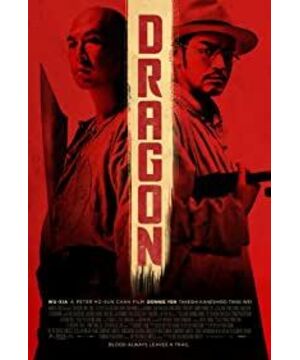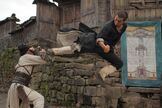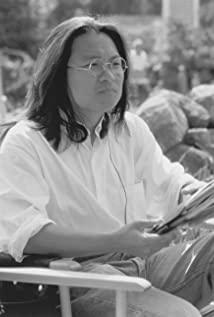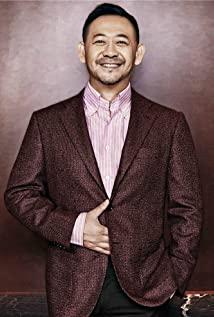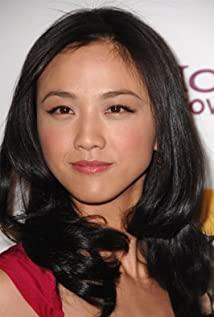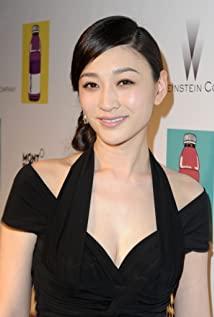Chen Kexin's cooking methods are soft and hard. Give the soft hand to Jincheng Wu, and the hard hand to Wang Yu. After the two flavors overlap, the movie named "Martial Arts" is three points more interesting than traditional martial arts films.
*****To
break the tradition of martial arts movies, "Martial Arts" does use elements that have not been used in Chinese martial arts movies in the past, making the work present a very unique taste.
In Chen Kexin's Wuxia, these two traditional connotations of "xia" are treated separately, and even the conflict between the two is particularly highlighted. What's more interesting is that "Wu Xia" presents the connotation of "punishing rape and eliminating evil" in the way of implementation in today's society, that is, "law."
*****
Xu Baijiu is such an alternative catcher. He is full of literary spirits, but he uses medicine and science to explain and dismantle the harms of various martial arts moves to the human body. With this design, Xu Baijiu's corner can release unprecedented interest. Coupled with the Sichuan local accent, it has a natural humor. I think this is director Chen Kexin's most breakthrough character setting in "Martial Arts".
*****When
Xu Baijiu first investigated Liu Jinxi’s self-defense killings, the director used self-injection to control the poisonous and suppressed sympathy analysis to strengthen his internal contradictions. On the other hand, he used slow motion and "watching The video of Xu Baijiu reproduced Xu Baijiu’s reasoning about the course of events, making it easy for the audience to think that everything was Xu Baijiu’s wishful thinking of being overly obsessed with "Dharma." It also regarded Xu Baijiu’s several tests on Liu Jinxi as a joke.
However, Xu Baijiu's entry and exit in Liujiacun reversed the plot. It turned out that his scrutiny was true.
Xu Baijiu once abused his compassion to harm others and himself. Therefore, he only recognized the "Dharma" but not the "Emotion", and did not believe that people could change. It was this kind of persistence that made him want to find out the true identity of Liu Jinxi and arrest him. However, several lives in Liujiacun, Liu Jinxi’s arm, and the property losses and panic of many innocent people were also caused by this. Come. Can this persistence of self-reliance and justice really bring better results to the world?
The most ironic thing is Xu Baijiu's "illegal methods" in this process. In addition to obtaining an arrest warrant by bribing the chief, what impressed me more was the subsequent dialogue with Tang Long. Tang Long believed in Xu Baijiu's guarantee that he would "not come back again" when he left, but Xu Baijiu broke his promise... Is it really impossible for people to change? In this brief conversation, the gangster who used to kill without blinking truly believed in the promise that Catcher had casually agreed to. On the contrary, Catcher, who had a gentle character in the past, used deceit and perfunctory tricks.
The so-called "law" is, after all, the rules of the game made by human society in order to maintain the survival of the group. Can it become a person's belief? "Martial Arts" provides a point of view.
*****
Before Liu Jinxi's disguised identity has not been discovered, there was a very interesting conversation between him and Xu Baijiu, the subject of which was the word "cause and fate". Liu Jinxi believes that everyone's various experiences in the world are the result of "karma gathering." Even killings are actually "common karma," rather than a single relationship between harm and victimization. At that time, Xu Baijiu laughed, and the audience probably thought Liu Jinxi's statement was specious.
If, compared with the death of the last leader, it has completed the echoes before and after. The seventy-two evil masters played by Wang Yu can be said to be the big devil in this film. If it is a traditional martial arts movie, the protagonist will suddenly think of a certain key when fighting, and after enlightenment, the level will burst, and finally he will defeat the big devil himself.
Chen Kexin's [wuxia] certainly didn't take this route.
After Tang Long had already broken his arm, the confrontation with the Great Demon King had no chance of winning. Even if Xu Baijiu used a golden needle to figure out the acupuncture points on the soles of his feet, he could hardly hurt the leader at all. In the end, Xu Baijiu "one more shot". At the top of the end, a sky thunder struck down, forming a ground (thinking of high school physics), and it was the death of the leader.
In the classroom, when this picture appeared, almost everyone laughed (our classmates always laughed and called it a lightning rod), maybe it was a reaction that would appear to be absurd to the extreme. However, in a rational analysis, it can be understood that this bridge segment is connected to the theme of the whole film; especially in the end, Xu Baijiu and the leader of the film died together, and provided a footnote to the word "common industry".
*****
For Tang Long who wants to abandon the past forever, who is the murderer who disrupted the life of "Liu Jinxi"...? Is it the leader, Xu Baijiu, or the past self? When it is impossible to determine an exact answer, one might have to say that it is called "common karma"; and the "dharma" created by humans, in the face of such entangled and complicated "common karma," seems so insignificant.
*****
This sky thunder to solve the big devil, under Chen Kexin's treatment, did not fall into the justice of "retribution unhappy", but created a black humor that was stunned, absurd, and laughable for the audience; quite " "The world is not benevolent, and everything is a dog" Taoist thinking. I don’t think this is a failure of the film, but I am also thinking about whether there is a better way, while still achieving a similar effect that echoes the theme? The
traditional route-"Tang Long and Xu Baijiu join forces to kill demons and kill demons, the righteous side "Victory" is absolutely infeasible. The concept of "sons do not kill their fathers" will not be easily violated. It also makes Ayu, who has no martial arts and is currently busy protecting his children, accidentally become a hero. It is logically reasonable but the plot writing is too difficult. .
*****I
believe that Xu Baijiu, the soul of the film, is played by Takeshi Kaneshiro. From "If Love", "To Be Famous" to "Wu Xia", this is the third time that Takeshi Kaneshiro has participated in Chen Kexin's film. In my opinion, Xu Baijiu's unhesitating and earnest perseverance in "Wu Xia" has a naturally formed sense of inexplicable joy. It matches the absurdity of the design everywhere in "Wu Xia", and this is very suitable for the drama of Takeshi Kaneshiro, so it has an exceptionally good result.
The soundtrack is very brilliant, very different from the way traditional instruments are used to play in the past; in the first half, when depicting life in remote villages, the brisk guitar is quite New Age; in the second half, when martial arts began to appear, it became rock and roll. (It feels like a whirlwind).
Finally, I want to talk about the beginning and the end of the movie. It is the scene of Liu Jinxi, Ayu, Fang Zheng, and Xiaotian who have a meal after bed in the morning, and then Jinxi goes to work; from "a mountain is a mountain" to "a mountain is not a mountain", and "Seeing a mountain is a mountain" again, it seems to be back to the original point, but the actual situation is not the case. The difference is not only that Liu Jinxi has become a one-armed, but also in the phrase "See you at night" when Ayu broke through anxiety and finally said. In Liu Jinxi (Tang Long)'s trembling smile.
View more about Dragon reviews


